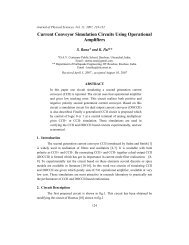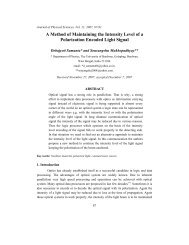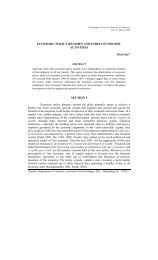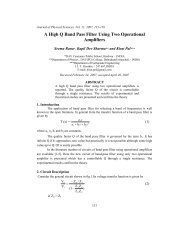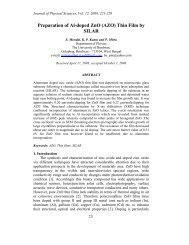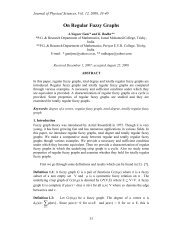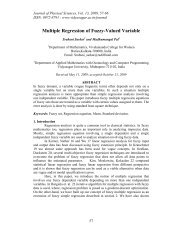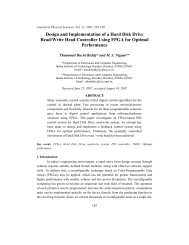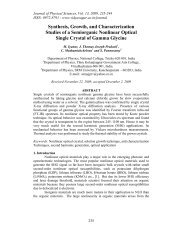VIDYASAGAR UNIVERSITY JOURNAL OF COMMERCE
VIDYASAGAR UNIVERSITY JOURNAL OF COMMERCE
VIDYASAGAR UNIVERSITY JOURNAL OF COMMERCE
You also want an ePaper? Increase the reach of your titles
YUMPU automatically turns print PDFs into web optimized ePapers that Google loves.
CORPORATE GOVERNANCE AND TRANSPARENCY SCENARIO IN ASIA<br />
Nine Dragons Paper Hong Kong Miscellaneous<br />
Mitsubishi Electric Japan Technology<br />
Resona Japan Financial services<br />
Wipro India Technology<br />
Hindustan Lever India Consumer<br />
Honda Motor Japan Automotive<br />
[Source: CLSA Asia-Pacific Markets, CG Watch 2007, page 43]<br />
No doubt, some Asian countries have a higher ratio of strengths to weaknesses than others.<br />
Appendix-1 highlights the major strengths and weaknesses regarding CG scenario prevalent<br />
in the Asian Countries. But certainly all the Asian countries are in a much better shape now,<br />
from a CG perspective, than they were at the start of this decade. The challenge, at present,<br />
is to keep going and avoid the temptation to sit back and relax.<br />
A Time for Rethinking<br />
Ethics is an ‘inspirational’ objective, and should represent the ‘intrinsic’ cultural values of<br />
the society in which a corporation operates, as well as, the behavior expected of the<br />
corporation in all its dealings with shareholders and other stakeholders generally. Where a<br />
corporation sees fit to codify ethical conduct, such guidelines should be succinct but<br />
sufficiently detailed to give a clear direction to the behavior of those to whom it is directed.<br />
Ethical practices and issues are both complex and vexed; no single or universal model can be<br />
defined or prescribed. It should be clearly noted that the notion of having “one size fits all”<br />
type of universal CG code is not only inappropriate but undesirable also. In any event, a<br />
number of countries, where the private enterprise sectors are relatively developed, have<br />
individually established national codes to address their own special requirements—namely,<br />
United Kingdom (Cadbury, Greenbury and Hampel Reports), Australia (Borsch Report),<br />
South Africa (King Report), Canada (Dey Report), India (CII) and Malaysia.<br />
Modern society is afflicted by “moral pollution,” which is not confined to the corporate<br />
sector alone, but is all pervasive. In such a climate, mere gimmicks of reforming the<br />
corporate sector would not automatically guarantee good CG. What is required is an<br />
evolution of a culture of social consciousness. As per Indian Shastras, “improvement in the<br />
quality of governance can improve only if each and every individual starts culturing human<br />
values in the inner world of himself. Search for effectiveness by culturing human values is a<br />
journey within the individual, within the self.” The global debate is gradually ‘converging’<br />
very much in favor of having “Code of Ethics and Values,” but the challenge is how to<br />
successfully implement it. The Indian Vedas had stated long back, how to do it with the help<br />
of an example: “A business should benefit from business like a honey bee, which suckles<br />
honey from the flower without affecting its charm and beauty,” thereby indicating that<br />
adopting ethical values and principles are the only solutions to prosperity and welfare of the<br />
society in the long-run.<br />
Undoubtedly, the starting point for reform in Asia is very different from the starting point in<br />
Europe or North America. Asian governments, corporate leaders, investors and regulators<br />
22 Vidyasagar University Journal of Commerce





